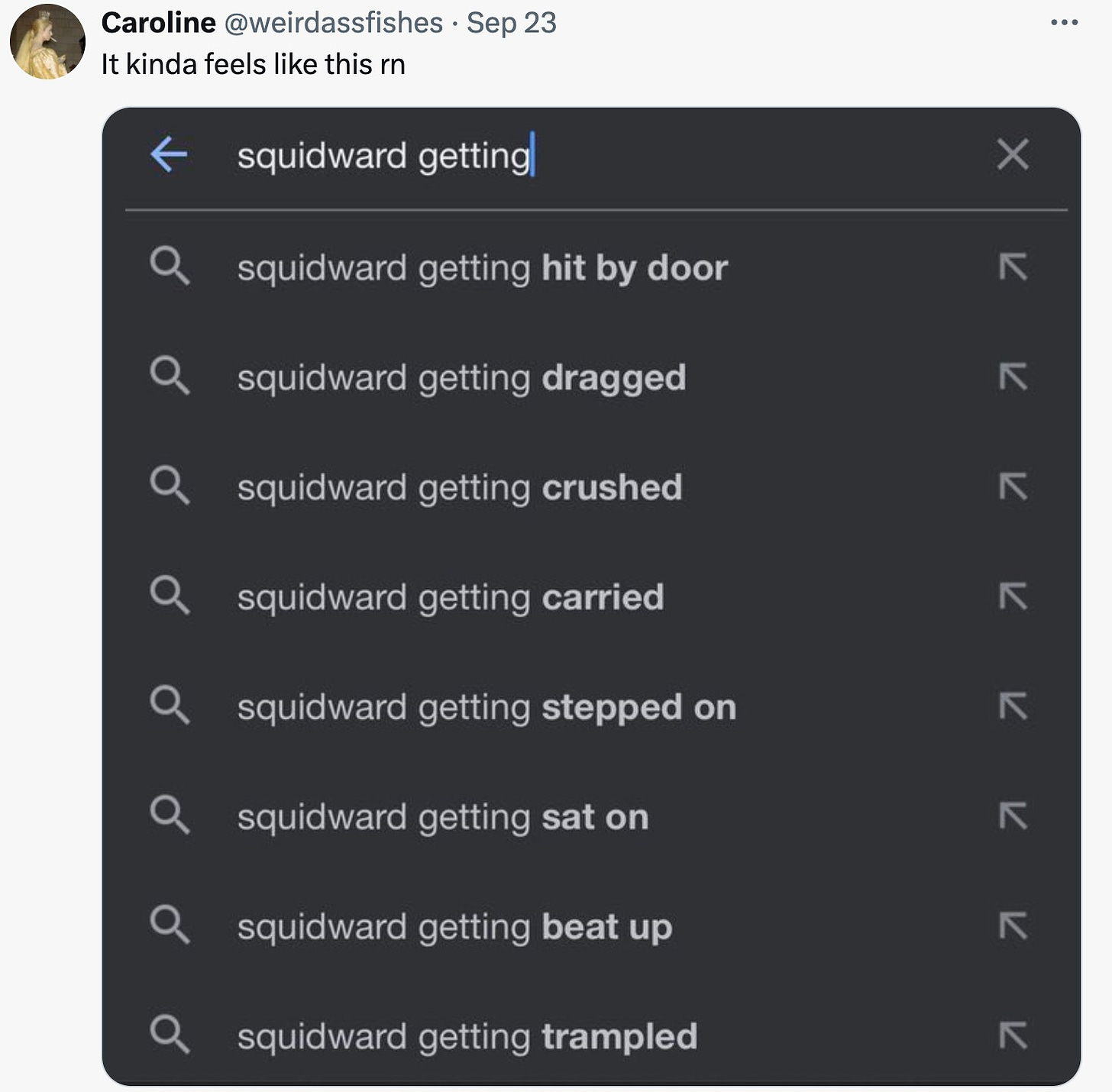Zorn: Parking app offers customer service heroics
& a proposal to alter our ridiculous method of electing a president
To read this issue in your browser, click on the headline above.
Eric Zorn is a former opinion columnist for the Chicago Tribune. Find a longer bio and contact information here. This issue exceeds in size the maximum length for a standard email. To read the entire issue in your browser, click on the headline link above. Paid subscribers receive each Picayune Plus in their email inbox each Tuesday, are part of our civil and productive commenting community and enjoy the sublime satisfaction of supporting this enterprise.
Tuesdays at 11:30 a.m. I talk with WGN-AM 720 host John Williams about what’s making news and likely to be grist for the PS mill. The WGN listen-live link is here.
Happy October!*
Spot heroics
I’m a frequent user of SpotHero, one of the apps that allows you to search for paid parking lots near your destination and reserve a spot in advance ( others include ParkWhiz, ParkMobile and ParkChirp, though I’ve never tried any of them). And I had three experiences with Spot Hero in September that I’d like to share.
Headed to a densely populated area on the near Northwest Side with poor on-street parking availability, I reserved a spot in a paid lot for $12 for the evening. But upon entering the lot I saw that the posted retail price for the evening was just $4.
Headed downtown I reserved a spot in one of those subterranean lots near (but not under) Millennium Park. The app provided only vague directions to the entrance and provided links to mapping programs that provided faulty directions that didn’t seem to recognize that some streets underground were blocked off for repairs. I drove around so long trying to find the entrance that I missed the start time of the event I was headed to and, even though I’d paid for the parking spot, I turned around and headed back.
Headed to an event near the Lincoln Park Zoo I booked a numbered spot behind a residential building on North Commonwealth Avenue. But when I arrived, another car was already occupying that spot.
But in all three cases, Spot Hero’s customer service responded promptly and appropriately when I complained. They refunded the difference in the first instance. credited me with a full refund in the second and, in the case of the occupied spot, responded immediately to my wife’s phone call and booked us a spot at a more expensive neighboring lot for the same price we’d paid for the occupied spot.
That level of responsiveness should not go unrewarded. So this item — as well as my enthusiastic future patronage — is my effort to offer such a reward.
Anyone else with a good customer service story?
A potential fix for the dreadful Electoral College system of picking a president
The U.S. Constitution requires the selection of a president by “electors” rather than a straight popular vote — a vestige of the days when direct democracy was viewed with considerable skepticism.
At the Constitutional Convention, George Mason of Virginia said, “It would be as unnatural to refer the choice of a proper character for a chief Magistrate to the people, as it would to refer a trial of colors to a blind man.”
Yet nothing in the Constitution requires the winner-take-all system of awarding Electoral College votes for president now in place in all but two states.
It would be far more consonant with the ideals of democracy for each state to apportion their electoral college votes by percentage of the statewide vote rounded up to the nearest whole number for the winner — for example, in 2020, the Joe Biden/Kamala Harris ticket would get 57.54% of the state’s 20 Electoral College votes which rounds up to 12.
This would all but eliminate the “battleground state” nonsense in which the extremely consequential decision of who should lead the nation is left in the hands of voters in a handful of states.
Here’s all that the Constitution says about presidential elections:
Each state shall appoint, in such manner as the legislature thereof may direct, a number of electors equal to the whole number of senators and representatives to which the state may be entitled in the Congress: but no senator or representative, or person holding an office of Trust or Profit under the United States, shall be appointed an elector.
The electors shall meet in their respective states, and vote by ballot for two persons, of whom one at least shall not be an inhabitant of the same state with themselves. And they shall make a list of all the persons voted for, and of the number of votes for each; which list they shall sign and certify, and transmit sealed to the seat of the government of the United States, directed to the president of the senate. The president of the Senate shall, in the presence of the Senate and House of Representatives, open all the certificates, and the votes shall then be counted. The person having the greatest number of votes shall be the president, if such number be a majority of the whole number of electors appointed; and if there be more than one who have such majority, and have an equal number of votes, then the house of representatives shall immediately choose by ballot one of them for president; and if no person have a majority, then from the five highest on the list the said house shall in like manner choose the president. but in choosing the president, the votes shall be taken by states, the representation from each state having one vote; a quorum for this purpose shall consist of a member or members from two thirds of the states, and a majority of all the states shall be necessary to a choice. In every case, after the choice of the president, the person having the greatest number of votes of the electors shall be the vice president. But if there should remain two or more who have equal votes, the senate shall choose from them by ballot the vice president.
The congress may determine the time of choosing the electors, and the day on which they shall give their votes; which day shall be the same throughout the United States.
A timeline at FairVote.org says that the “district” system (apportioning Electoral College votes by Congressional district) began losing out to the winner-take-all system in 1824, and “the defeated Andrew Jackson joined James Madison’s pleas for a constitutional amendment requiring a uniform district election system, but to no avail.”
In 1836, “all but one state, South Carolina, use(d) the winner-take-all method based on the statewide popular vote to choose its electors.” Then in 1872, all states were winner-take-all.
My argument is that the current system effectively disenfranchises millions of voters of both parties in more than 40 states because they end up having no voice whatsoever in the election of the president.
Now, yes, a ruling to this effect by the U.S. Supreme Court would seem to run afoul of the idea that electors be chosen “in such manner as the legislature thereof may direct,” but that manner would certainly be limited if a state refused to, say, allow women or certain ethnic or religious minorities to be electors or simply passed a law in their states decreeing that all electors henceforth will vote for the Republican candidate no matter what the outcome of the popular vote.
FairVote has a history of this and other ideas to abolish the way the Electoral College now operates, offering up “just a few examples”of more than 700 attempts to fix this clearly broken system.
Notes and comments from readers — lightly edited — along with my responses
A debate for the hot-stove league
Joe Kusiak — The media are calling the 2024 White Sox the worst team in baseball history.
But really? By winning percentage they are just the 5th worst in the 20th and 21st centuries:
1916 Philadelphia Athletics 36- 117 .235
1935 Boston Braves 38-115 .248
1962 New York Mets 40-120 .250
1904 Washington Senators38-113 .252
2024 Chicago White Sox 41-121 . 253
Yes, they had the most losses, but if you go by winning percentage they weren’t.
Zorn — Yes, and the Sox somehow won five of their last six games to touch off endless debates about the significance of 121 losses against 41 victories. Had they won just four of the last six their winning percentage would have been .247 and they’d have been number two on this list. Had they won just two of their last six games — as the odds suggested they would — they’d be number one on this list and the undisputed worst team in modern baseball history.
A disappointment to the end!
Budget woes and infighting at the Chicago Public Schools
Pete Prokopowicz — Your view of the unsanitary shitshow clusterfuck involving Mayor Brandon Johnson, the Chicago Public Schools and the Chicago Teachers Union is amusing to me through my peep hole from just outside Chicago. I keep saying to myself, isn't this what Chicago voted for? Mayor Johnson is not beholden to the CTU; he is of the CTU. The CTU, completely understandably, supports more jobs, tax money, and benefits for itself. To them, everything else is someone else's concern.
Laurence E Siegel — Yes, it would be nice to have full time nurses, librarians, social workers, arts teachers, and others in every school building. But CPS cannot even afford to hire enough regular classroom teachers. High schools with 200 or less students can't offer much of an academic program. Just how many teachers are needed for 200 students? The CTU is living in a dreamworld, while Pedro Martinez is trying to explain to them the facts of financial life.
Jeff Pieler — The question that progressives are not asking is: Why do we continue to give (or even discuss) giving more and more money to a school system with a record of failure and no incentives to deliver desired results?
David Leitschuh — The CTU has spent over $24 million in political contributions since 2010, and around $6 million in 2023 alone to get Brandon Johnson elected. CTU has made political contributions to 30 of the current 50 alder persons and a large number of state representatives and senators. Maintaining aged infrastructure which in many cases has a fraction of the student capacity, particularly in a budget challenged environment, is absolutely wrong. But CTU knows that school closings result in consolidations and elimination of positions due to redundancies. Their money comes from member dues, so they are adamant about ever expanding staffing, even in the face of declining enrollment.
Garry Spelled Correctly — School's CEO Martinez is correct, you don't borrow hundreds of millions to pay for pay increases, that's a prescription for a financial disaster down the road! I've been pro-union all my life, but not this one! Not ever!
Jake H. — I just listened to the latest “Mincing Rascals” podcast. Marge Halperin and Cate Plys well illustrated two sides of the public schools debate, both of which are wrong. Marge insists that CPS is underfunded, and she sympathizes with moves away from measuring performance with test scores. Cate, meanwhile, insists that test scores tell us that some schools must "be doing something right."
What both of these narratives miss is that schools are overwhelmingly a reflector rather than a generator of differences in student academic performance. Yes, educational practices make differences at the margin -- and really bad school environments are probably really bad -- but, big picture, academic performance tends to march in lockstep with the abilities and proclivities of the clientele, as well as their everyday environments outside of class in which students spend the vast majority of their waking hours. Framed as a simple thought experiment -- imagine magically switching out the faculty and facilities of a low-performing school and a high-performing one -- I think this seems intuitively obvious. You might expect to see small improvements but probably not huge ones.
Educational research -- hard to do with experiments -- is a vast graveyard of failed interventions and faddish notions, where even small effect sizes count as major, much ballyhooed wins. Schools are bumping up against hard social realities over which they have little control. It's akin to blaming the police for differences in crime. While differences in police practices may make some difference, you would hardly look at the low crime rate of, say, North Shore suburbs and conclude that those suburban police departments must be "doing something right."
To have any serious discussions about education at any level, we have to administer a major adjustment to how we think about schools. We expect far too much of them. So long as we do, we will forever be disappointed.
Zorn — Yes. I reject the idea that the CTU represents teachers who are failing their students. These teachers face many challenges with an often troubled student population, and I contend that if you put the teachers from, say, Stevenson High School in Lincolnshire, Chicago’s Northside College Prep or any other high achieving schools into low performing CPS school then put the teachers from those schools into the top schools, I doubt you'd see much of a difference if any in student achievement.
For another counterpoint I’ll direct readers to CTU President Stacy Davis Gates’ op-ed in Monday’s Tribune, “Chicago’s public schools have never been fully funded.” She writes, “No one loses when we invest in arts, sports and literacy for our youths.” This is true, but, true to form, Davis Gates offers nothing useful in the way of suggesting who is going to do this investing.
Paul Grajciar — So what is the specific drain on the Chicago Public Schools that creates this deficit? I don’t think we can blame it all on bad vendor contracts.
Zorn — My guess is that it's a combination of such factors as underutilized buildings, increased demands on the system to accommodate students with differences, bureaucratic bloat, unwise borrowing in past years, previous pension underfunding and other things such as the end of COVID-19 relief funding. Maybe someone can point to a published analysis of this problem.
Another thought on tariffs
Marc Martinez — It seems clear to everyone that tariffs are ultimately paid by consumers in higher prices and can be thought of as a tax on consumers. But I have never seen an article making the same assessment of corporate taxes. The analysis is exactly the same.
Corporations must produce a continuing profit, after all expenses, in order to stay in business. Corporate taxes are passed along to consumers in the prices of products. So corporate taxes are also an indirect tax on consumers.The consumer impact is narrower for tariffs as they are targeted to imports of specific items or source countries. Corporate taxes directly affect all products sold in the US, by US headquartered corporations and the US subsidiaries of foreign corporations.
Zorn — I confess to not being smart enough about macroeconomics to be able to respond to this contention, which makes some sense to me. Would eliminating corporate taxes and instead levying much higher taxes on upper incomes to make up the difference? The following letter may shed some light:
Jeff Biss — It is an economic law that wealth aggregates and that if wealth isn't controlled, wealth takes control. This is seen in every civilization that did not control wealth as none had a sizable middle class, but a division between the few with vast wealth and those that had little to nothing, such as Rome, Egypt, Medieval Europe, etc.
It was the income tax with its high upper marginal tax rates that created our inclusive, extensive middle class and it was the reduction of the top tax rates at Reagan that started the erosion of the middle class and redistributed earnings from workers back to the rich and moved their jobs to low-wage labor markets to increase profits to corporations and their investors, that trickle-down nonsense. Supply-side/trickle-down economics is a sham and has failed absolutely, including that argument that corporations shouldn't be taxed and tariffs not implemented because they affect consumer prices.
It really must be asked whether we really want an economic system based on rich people taking the wealth generated by the labor of workers; Should our economy be based on the return demands of investors or the needs of labor? Also, tariffs should be levied to level competition, such as charging tariffs to cover the externalization of environmental costs of foreign producers that are not environmentally responsible as American producers.
Despicable Him
Shelley Riskin — You write that you despise Elon Musk. Yet you are enabling him by being a Twitter/X user, and adding to his wealth! Get off the platform — there are others you can use. If you won't do so, then you have no credibility or cause to complain.
Zorn — The other platforms aren’t nearly as good for news and jokes, and I don’t pay Twitter — those who do are truly enabling him and ought to think twice about it. But I admit it’s not an easy decision to stay on the site, for Musk is increasingly deplorable.
A hard ‘no’ on symbolic voting
Michael M. —Voting third-party is a good way to let marginalized groups know that your abstract principles are more important than their very real lives.
Discipline for the transcriber!
John N. – Last Thursday, you quoted from a statement released by a group of prominent people including officeholders that said “Chicago needs more physical discipline, not less." Did those big shots actually says "physical" in their release rather than "fiscal?" Or was this simply a transcription error?
Zorn — Transcription error. Followed by editing oversight. I will post a full d’oh! in Thursday’s issue.
The week’s best visual jokes
Here are some funny visual images I've come across recently on social media. Enjoy, then evaluate:
There’s still time to vote in the conventional Quip of the Week poll, which consists of dad jokes.
*
“Welsh Rarebit, Welsh Rarebit.”
Just trying out some variations on the theme.
Thank you for supporting the Picayune Sentinel. To help this publication grow, please consider spreading the word to friends, family, associates, neighbors and agreeable strangers.
Contact
You can email me here:
I read all the messages that come in, but I do most of my interacting with readers in the comments section beneath each issue.
Some of those letters I reprint and respond to in the Z-mail section of Tuesday’s Picayune Plus, which is delivered to paid subscribers and available to all readers later Tuesday. Check there for responses.
If you don’t want me to use the full name on your email or your comments, let me know how you’d like to be identified.


















To Michael M. on Third-Party Voting, esp. this year: Thanks for saying concisely what I have fumbled to say to friends.
If all the states were willing to apportion their Electoral votes by popular vote they should also be willing to pass a Constitutional amendment to abolish the EC outright, which doesn't seem likely to happen anytime soon. In the meantime I think we should focus on overhauling the 1929 law capping the number of representatives at 435, which has led to larger states losing voting power in Congress and in the Electoral College. If we based the number of representatives on the total population divided by the population of the smallest state, we would have 140 more members in the House now, and the same bump in EC votes allotted.